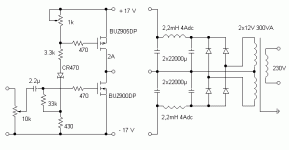Is it possible to build a stable mosfet push pull amp without feedback? I have a couple questions on something I was attempting to design.
My simulation consisted of a differential pair on the input, folded cascode, with a Vgs multiplier, driving a push-pull output stage biased into class A.
I was altering the dc offset using the current source on the differential amp. Is there a better way to set the output stage to 0V? question #2- is thermal drift a problem with this type of an amp, and how would you go about controlling it?
I would like to understand this type of circuit better. My ultimate goal with this is to mirror the cascode and output stage on the other half of the differential pair to form a push-pull X (super symmetry) amp, but I want to understand the basics first.
Any helpful hints?
My simulation consisted of a differential pair on the input, folded cascode, with a Vgs multiplier, driving a push-pull output stage biased into class A.
I was altering the dc offset using the current source on the differential amp. Is there a better way to set the output stage to 0V? question #2- is thermal drift a problem with this type of an amp, and how would you go about controlling it?
I would like to understand this type of circuit better. My ultimate goal with this is to mirror the cascode and output stage on the other half of the differential pair to form a push-pull X (super symmetry) amp, but I want to understand the basics first.
Any helpful hints?
In fact every circuit has some kind of feedback. You probably mean global negative feedback from output to input. Even a voltage follower has a 100% local feedback. Some other circuits may have different local feedback. You can distinguish between serial, parallel, voltage and current feedback.
PMA said:In fact every circuit has some kind of feedback. You probably mean global negative feedback from output to input. Even a voltage follower has a 100% local feedback. Some other circuits may have different local feedback. You can distinguish between serial, parallel, voltage and current feedback.
yeah... I know what you mean. I was talking about global negative feedback.
Maybe the experts will disagree, but IMHO it should generally
be easier to make a non-NFB amp stable. Although you might
still get instability from local feedback loops (deliberate or
parasitic) and interstage phenomenae, global feedback is
the main reason for instability problems.
be easier to make a non-NFB amp stable. Although you might
still get instability from local feedback loops (deliberate or
parasitic) and interstage phenomenae, global feedback is
the main reason for instability problems.
nobody special said:I guess I was thinking more of the output stage drifting... dc levels of the whole amp shifting around. I thought that feedback helped control that kind of thing. At least without GN feedback I won't have to worry about oscillation (other than from poor layout).
Ah, that's a different story. Yes global feedback is usually
exploited to reduce the DC offset. Unless you are using
coupling caps within the amp, you actually could have a DC-only
global feedback for this purpose, ie. a feedback network
with a very-low-frequency lowpass filter, if DC is a problem.
Hm, rereading what you wrote, well you can't really control
the various DC levels in the amp separately by feedback, so
that is a problem you have in either case.
Christer said:
Ah, that's a different story. Yes global feedback is usually
exploited to reduce the DC offset. Unless you are using
coupling caps within the amp, you actually could have a DC-only
global feedback for this purpose, ie. a feedback network
with a very-low-frequency lowpass filter, if DC is a problem.
Would that be considered a servo?
Part of what I liked about the design was that it is basically a single voltage gain stage with a follower, if you consider the cascode to be a single gain stage.
nobody special said:
Would that be considered a servo?
No, it's just global feedback of DC (and very very low frequencies).
The difference, in my understanding, is basically that a servo
uses an active element, usually an op amp, to form a active low
pass filter, to do the same thing.
Would that work on an amp that is running very low open loop gain (29db)? It doesn't seem like it would do much.No, it's just global feedback of DC (and very very low frequencies).
nobody special said:
Would that work on an amp that is running very low open loop gain (29db)? It doesn't seem like it would do much.
Good question. It depends on how much DC you have out.
you can't reduce it more than the open-loop gain, ie. 29dB.
I guess a servo solution could improve this since it could actually
amplify the feedback DC signal in addition to LP filtering it.
Well, I don't dare go into any details there, so that's for the
servo guys to answer.
- Status
- This old topic is closed. If you want to reopen this topic, contact a moderator using the "Report Post" button.
- Home
- Amplifiers
- Solid State
- ClassA mosfet p/p amp with no feedback?

